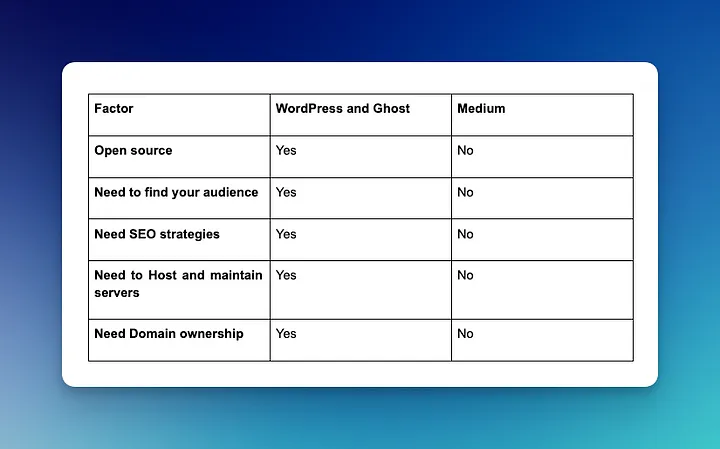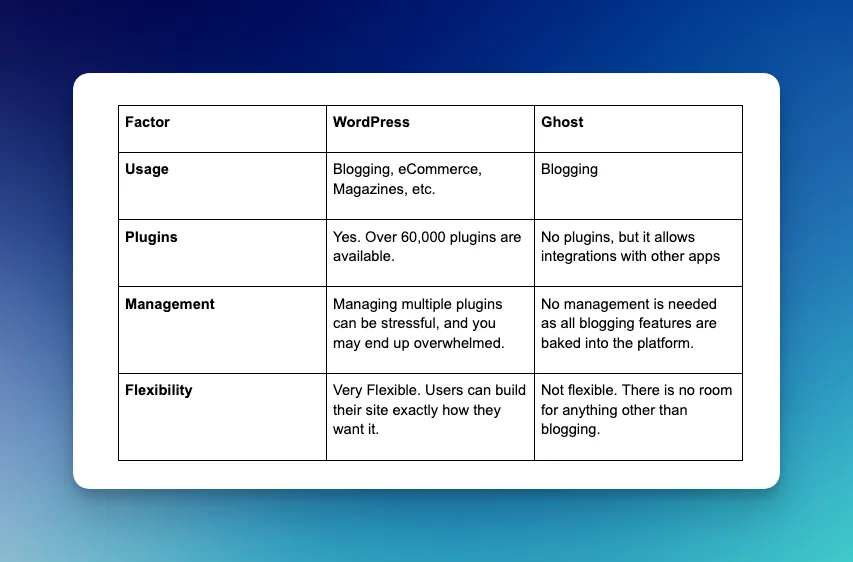WordPress Vs. Ghost Vs. Medium — Which Platform is Best For You?
Are you trying to build your website or start a blog and are torn between WordPress, Ghost, and Medium? You’re not alone.
These platforms are similar in terms of what they can be used for, but specific differences make people choose one over the other.
In this post, we’ll briefly summarize all three platforms and look at what makes them different or similar. This will help you pick the one best suited for your needs.
Prefer to watch? Here’s a video of me comparing the three platforms. 👇
WordPress
If you’re even slightly active on the internet, you’ve heard of WordPress. It’s the most used website building and content management platform available today, accounting for over 800 million websites (about 43%).
WordPress is an open-source platform. This means they have a developer community that continuously contributes to the source code, and users can participate in discussions that affect the platform.
Many website owners and bloggers flock to WordPress mainly because of its flexibility. If you want a basic blog or a fully functional eCommerce store, you can build one on WordPress. The platform has a paid version (WordPress.com) for users who prefer to avoid technical obstacles or a free version that requires an understanding of how the ins and outs work.
Ghost
Ghost is a straightforward blogging platform with a very clean user interface. It is a 100% blogging website, meaning it doesn’t cater to different kinds of websites as WordPress does. So, if you want a simple and easy-to-use platform solely for blogging, Ghost is the best option.
Like WordPress, it’s open source and users can contribute to web development conversations that affect the platform. It also has a self-hosted and hosted version.
What sets Ghost apart from other blogging platforms is its minimalism and focus. If you want a simple solution that lets you create, edit and share blog posts, Ghost is the one for you. Ghost also comes with a newsletter subscription and the ability to put specific posts behind a paid wall.
This platform is perfect for those who want to put quality content out there and have the ability to monetize without doing any heavy lifting.
However, this platform may not work if you want eCommerce, multi-author, or magazine management and hosting solutions.
Medium
Medium is a community-focused writing tool. Unlike WordPress and Ghost, you don’t need to self-host or use a hosted solution. Medium works similarly to Facebook or Instagram, where you can open an account and begin to post.
This platform features different kinds of writers that focus on niche topics and share their contributions with an already-available community. Medium is not open source like Ghost and WordPress, so users cannot contribute to what happens in the back end.
Medium also has a paid membership program that motivates contributors to share their best work and earn money based on ‘claps.’
If you don’t want the hassle of building a blog and still want to share your ideas with the world and possibly earn money, Medium is the best option.
WordPress Vs. Ghost Vs. Medium — Which Platform Wins the Blogging Battle?
Now that we briefly summarized each platform, let’s go into more detail about what differentiates them.
For clarity purposes, we will assess WordPress and Ghost against Medium first. This is because WordPress and Ghost are both open-source blogging platforms, while Medium is the outlier.
Right off the bat, the biggest difference between WordPress and Ghost compared to Medium is that bloggers using WP and Ghost must deploy SEO and marketing strategies to get discovered by their ideal audience. However, with Medium, you simply tap into an existing audience and build momentum as a solid contributor over time.
Here’s a tabular overview of the major differences between the three platforms. 👇

WordPress Vs. Ghost — The Biggest Difference
Before we dive into the difference between these two solutions, here’s a little backstory;
The founder of Ghost, John O’Nolan, was formerly an open source maintainer at WordPress, spending most of his time making the platform better for users. Over time, he felt WordPress had become quite an extensive solution trying to cover every angle instead of simply providing a focused blogging solution for bloggers.
This was the motivation and the driving force for Ghost. He created the platform for bloggers to grow their businesses without dealing with the massive solution that WordPress had become. Contrary to common opinion, John didn’t create Ghost as an alternative to WP, but rather a fully tailored solution for bloggers who want to blog and nothing more.
A lot of people like to compare WordPress to Ghost. However, they couldn’t be more different regarding flexibility, usage, and other factors. For example, you go to WordPress and find full Government websites, huge tech businesses, and celebrity websites being hosted on the platform. Then you go to Ghost and see nothing but bloggers and more bloggers.
You can read John’s 2017 interview with IndieHackers here to learn more about his journey from a contributor at WordPress to launching Ghost.
When choosing between WordPress or Ghost, the major factor to consider is whether you want a simple blog with social sharing features, monetization, and SEO, or you may want to expand into something bigger in the future.
WordPress is the right option if you want a one-stop do-it-all platform where you can blog and have an eCommerce store concurrently. However, if you just want to blog and earn from it, Ghost is probably the platform for you.
One similarity is that both platforms offer hosted and self-hosted versions.
Self-hosted: Here, You install the tech stack and manually piece it all together. This option can be daunting, and although WordPress has tried to make it as easy as possible over the years, it is still challenging for people who aren’t a bit tech-savvy.
Hosted: This means you just focus on blogging while the experts handle the technical aspect for you. WordPress and Ghost have hosted versions where you pay for their experts to install and manage the tech stacks for you. You can also go another route and use third-party hosting solutions like GoDaddy, BlueHost, or DigitalAtar.
Fun fact for tech geeks: Ghost is coded in Node.js while WordPress is in PHP.
Another major difference is that WordPress has thousands of plugins, while Ghost does not. This is because everything you need to run and maintain a successful blog on Ghost, from SEO to analytics tracking and monetization, is already baked into the platform.
Unlike WordPress, with Ghost, you don’t need several plugins that could become difficult to manage and expensive as your blog grows.
Here is an overview of the major differences between WordPress and Ghost. 👇

Final Thoughts: WordPress Vs. Ghost Vs. Medium
WordPress creates a platform that lets you build anything you want. With over 60,000 plugins available, users can keep building as they go. You can start from a basic blog and later become a fully functional eCommerce store. If you think you may need to do more in the future other than just blogging, choose WordPress.
On the other hand, Ghost stands firm on its unique selling point (USP), a platform fully focused on blogging. Basically, if you want a fully equipped platform to build and grow your personal blogging space that’s simple, can be monetized, and easy to manage, you should choose Ghost.
Finally, Medium is the perfect option for writers who want to share their contributions with the world without worrying about owning an online space, SEO, and ranking on SERPs. If you can’t handle all the tech talk and simply want to write and earn, choose Medium.
Each platform has certain perks that make it unique and flaws that make users look the other way. Whichever platform you choose, ensure it fully covers your needs and is the best pick.